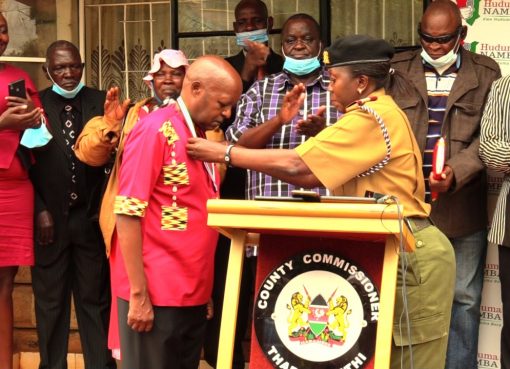The David Sheldrick Wildlife Trust will construct an electric fence along a 60 km stretch bordering Chyulu National Park at a cost of Sh. 120 million, a Project Officer, James Mbuthia has said.
Mbuthia said that the construction of the fence will start at Wikiamba to Kirinyeti in Makindu Sub-county and it is geared towards bringing to an end the human/wildlife conflict that has been witnessed in the area for a long time.
“The trust has been interested in solving human/wildlife conflicts and we have secured funding for the entire project and this will put an end to the endless suffering of the local community from the wildlife menace,” said Mbuthia at Hunters Lodge in Kiboko Makindu Sub-county on Tuesday while addressing the media.
In this regard, he asked for the support of local leaders and the community, adding that his organization intends to construct the fence before they can actualize the project before the next planting season.
The Makueni County Commissioner (CC), Maalim Mohammed said that the human/wildlife conflict in the area will be a thing of the past after the completion of the electric fence.
The administrator said the cases of loss of lives, injuries and crop destruction witnessed in communities bordering the National Park will be reduced greatly.
“The construction is also aimed at minimising human/wildlife conflict, reduce injuries, and loss of lives caused by wild animals and curb food shortage resulting from damage caused by the marauding elephants,” Said Mohammed.
During the media briefing, Mohammed said that the most affected areas were Masongaleni and Mangelete in Kibwezi Sub-county and some parts of Makindu Sub-county while, adding that the communities in these areas will now harvest their crops unlike in the past.
At the same time, the administrator said that the government will resolve issues pertaining to squatters who have invaded the Kenya Agricultural Livestock Research Organization (KALRO) besides other emanating disputes.
However, he disclosed that about 41,000 acres belonging to KALRO will go to the community only after underlying issues have been resolved through public participation.
Consequently, he called upon elected leaders and other stake holders to support the project which is to start immediately to end the human wildlife conflict in the said areas.
“We need political goodwill. Out of the 71,000 acres of land, KALRO has remained with only 30,000 acres to do their research. We have to resolve the pending issues of encroachment especially the agitating squatters,” he said.
Mohammed disclosed that the David Sheldrick Wildlife Trust, will maintain the fence for the next 25 years.
During the briefing it was revealed that claims for compensation arising from destruction of crops by wildlife especially elephants, has accumulated to over Sh. 400 million.
Speaking at the function, the KALRO Kiboko Centre Manager, Simon Kuria said that in the recent past, they have about 200 families who have invaded their land and were interfering with the research they conduct that need to be delivered to Kenyans.
While saying they also carry out research on best livestock breeds, Kuria noted that people usually graze their animals on pasture which is meant for research to benefit Kenyans.
“The people do not differentiate good pasture meant for research and ordinary grass, they just graze their animals hence hampering us from delivering our mandate to Kenya people,” said Kuria.
By Ann Murigi/Franciscar Kinyili




